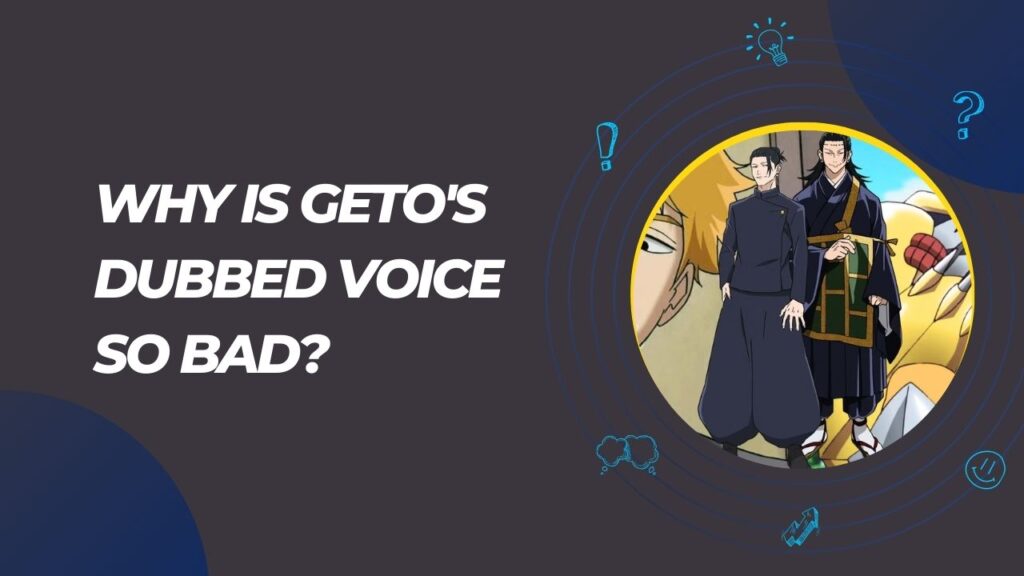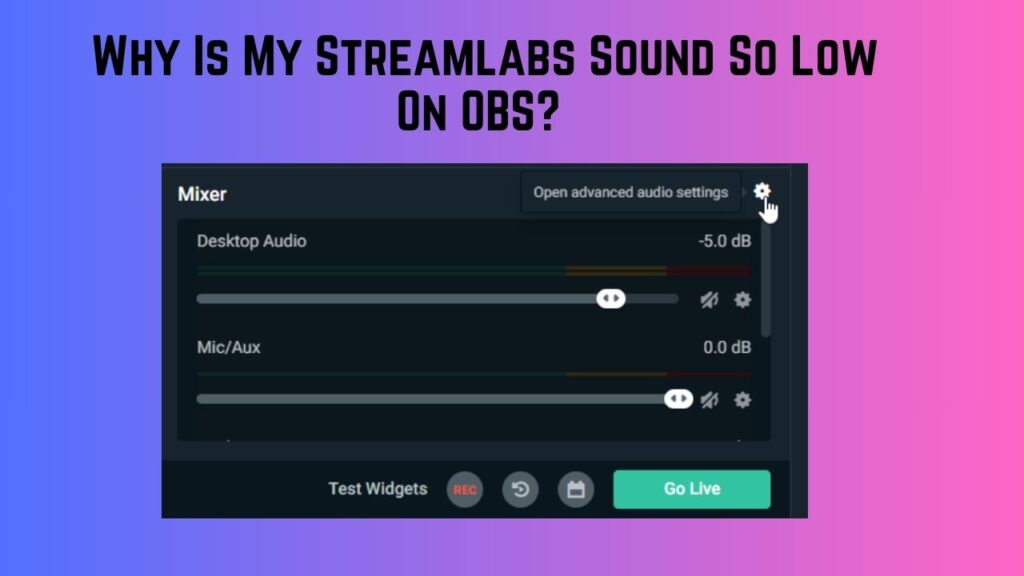Why Is Geto Dubbed Voice So Bad? Some viewers find Suguru Geto’s English voice lacking due to Lex Lang’s portrayal, which they feel doesn’t capture the character’s depth.
Suguru Geto, a popular character in Jujutsu Kaisen, stands out not just for his complex role in the series but for his deep, brooding voice that has captured fans worldwide.
However, the recent English dub has sparked debates among fans, with many voicing disappointment in how Geto’s character was handled in the adaptation.
Some feel that the English dub lacks the same gravitas and dark charisma that made Geto’s original Japanese voice so memorable.
This article dives into the reasons behind this criticism, exploring both the cultural and technical challenges of dubbing a character like Geto.
Who Is Suguru Geto?
Character Background:
Suguru Geto is not your typical villain. Once a student at Jujutsu High, he shared a close friendship with the protagonist Satoru Gojo.
However, his philosophy and worldview took a darker turn, leading him to embrace curses and embark on a path of destruction.
Geto’s character arc is laden with tragedy, complexity, and a philosophical darkness that resonates deeply with fans. [Why Is Geto Dubbed Voice So Bad?]
His voice is an essential component of this, conveying his bitterness, intellectual depth, and confidence, which are pivotal to understanding his motives and sympathizing with his path.
Importance of Voice Acting:
For an anime character, voice acting does much more than provide dialogue; it adds layers to their personality, emotions, and inner conflicts.
With Geto, his voice serves as a mirror to his tortured soul, showcasing his disillusionment and anger at the world. [Why Is Geto Dubbed Voice So Bad?]
A single misstep in casting or performance can make a character like Geto feel hollow, as voice acting is fundamental to anime storytelling.
Fans expect a voice that captures the darkness and allure of Geto’s character, a high bar set by the Japanese version.
The Controversy Around Geto’s Dubbed Voice
Fan Reactions:
Upon hearing Lex Lang’s portrayal of Geto, fans took to social media to express their disappointment.
Many commented that Lang’s voice felt less intense and lacked the emotional resonance they had come to expect.
For fans who closely follow the anime’s Japanese dub, Geto’s voice is iconic, adding an eerie, chilling quality to his persona.
When this was not replicated in the English dub, many felt the character’s essence was lost. [Why Is Geto Dubbed Voice So Bad?]
Comparison to Japanese Voice Actor:
In Japan, Geto was voiced by Takahiro Sakurai, an actor renowned for his ability to portray brooding, conflicted characters.
Sakurai’s Geto had a haunting, almost poetic quality, layering menace with hints of regret and sadness.
This portrayal set a high standard, and English-speaking fans expected the same intensity in the dub. [Why Is Geto Dubbed Voice So Bad?]
However, Lang’s performance is often seen as lighter and less intense, resulting in fans feeling that a key element of Geto’s personality was lost in translation.
Why the Dubbed Voice Feels Off
Lack of Depth in Tone:
Lex Lang’s portrayal of Geto has been criticized for lacking the deep, resonant tone that made Sakurai’s performance so memorable. Fans feel that Lang’s voice doesn’t capture the full range of Geto’s emotions.
While Sakurai used a mix of subtle pauses, quiet anger, and layered vocal tones to convey Geto’s despair, the English dub feels comparatively flat and straightforward, failing to encapsulate the character’s internal struggle.
Voice Acting Styles:
The anime voice acting industry in Japan has a distinct style, often more expressive and nuanced compared to its English counterpart. [Why Is Geto Dubbed Voice So Bad?]
Japanese voice actors are trained to embody their characters fully, using vocal techniques that emphasize emotional authenticity.
This emphasis on capturing every nuance of a character’s personality and backstory is central to Japanese voice acting, especially for characters as complex as Geto.
English dubs, while improving in quality, can sometimes struggle to meet these expectations, as cultural nuances and differences in acting methods can impact how the performance is perceived.
Character’s Image and Tone:
Geto’s character balances darkness, elegance, and intelligence, a rare combination that requires a highly nuanced voice performance.
His voice should exude both menace and a tragic allure, making him both intimidating and oddly sympathetic. [Why Is Geto Dubbed Voice So Bad?]
Fans feel that the English dub didn’t fully capture this, leaving Geto sounding somewhat one-dimensional and less intimidating.
In the English dub, Geto’s voice sounds less foreboding, reducing the tension his character brings to scenes.
The Impact of the Original Japanese Voice Actor Controversy
Takahiro Sakurai’s Role:
Takahiro Sakurai, known for bringing his dark, mysterious tone to Geto’s character, recently faced controversy due to personal matters. [Why Is Geto Dubbed Voice So Bad?]
This scandal led to discussions around whether he would continue voicing Geto. For fans, Sakurai’s voice was iconic; his vocal portrayal had become integral to how they experienced Geto’s scenes.
Changing voice actors mid-series or bringing a new tone to the character could impact how the character is perceived, especially for a role as essential as Geto.
Impact on Character Perception:
Even for a skilled voice actor like Lex Lang, following Sakurai’s renowned portrayal is challenging, as fans have become attached to Sakurai’s interpretation of Geto.
Any new portrayal, particularly one that differs in tone or style, is likely to be scrutinized. [Why Is Geto Dubbed Voice So Bad?]
Fans who view Sakurai’s performance as the “true” Geto may struggle to connect with an alternate voice, as it can feel like an entirely different character.
This shift may explain why many viewers find the English dub jarring. [Why Is Geto’s Dubbed Voice So Bad?]
The Unique Challenges of English Dub Voice Actors
Adaptation Limitations:
English voice actors face unique challenges when dubbing anime characters, including language constraints and cultural differences that affect how characters are portrayed.
Adapting a script originally written in Japanese means adjusting phrasing, timing, and even emotions to fit English-speaking audiences while retaining the character’s core essence.
For someone like Lex Lang, trying to bring Geto’s nuanced character to life within these constraints is no easy feat.
Matching Fan Expectations:
Anime fans are known for their dedication to character accuracy. For Geto, a character deeply rooted in Japanese culture and emotions, fans have high expectations.
They often want the English dub to mirror the intensity of the original, including the smallest details in tone and delivery. [Why Is Geto Dubbed Voice So Bad?]
Any divergence can feel like a disservice to the character, leading to the type of backlash seen with Geto’s dubbed voice.
However, Lang’s interpretation of Geto’s voice reflects his own understanding of the character, shaped by the constraints of an English adaptation.
Cultural Nuances in Dubbing:
Japanese language and culture have specific expressions, vocal tones, and emphases that may not always have an English equivalent.
In the Japanese language, subtle vocal inflections can imply a wide range of emotions, from subtle sadness to quiet rage. [Why Is Geto Dubbed Voice So Bad?]
These nuances can be difficult to capture in English, where the words and tones may not align perfectly with the original performance, resulting in a voice that doesn’t fully match fans’ expectations.
Fan Expectations and the Role of Voice Actors
Expectations from the Anime Community:
Fans of Jujutsu Kaisen expected Geto’s English voice to bring the same emotional intensity as the original Japanese.
When this wasn’t met, many voiced their disappointment. This is not unusual in anime; characters with complex backgrounds and unique personalities tend to develop a loyal fan base that holds high expectations for voice accuracy.
For these fans, voice acting is not just a technical skill; it’s a form of character artistry that should align closely with the character’s essence.
Voice Actor Limitations:
Even with significant talent and experience, voice actors like Lex Lang face limitations in bringing anime characters to life.
They must balance the original intent with the realities of adaptation, such as lip-synching and script changes.
Despite his experience, Lang’s portrayal of Geto may have fallen short for fans due to these constraints. [Why Is Geto Dubbed Voice So Bad?]
However, the criticism does raise awareness of the unique challenges of English dubbing, reminding fans that voice actors have to work within the framework provided to them.
See Also: Why Is Deathloop So Unoptimized? The Truth!
Conclusion: Why Is Geto Dubbed Voice So Bad?
The criticism surrounding Geto’s English dubbed voice underscores the importance of voice acting in anime, especially for characters as complex as Suguru Geto.
While Lex Lang’s performance may not resonate with every fan, it opens up a broader discussion on the challenges of adaptation and the limits faced by voice actors.
For fans, Takahiro Sakurai’s performance remains iconic, shaping how Geto’s character will be remembered. [Why Is Geto Dubbed Voice So Bad?]
As anime dubbing continues to evolve, fans may see more attempts to bridge the gap between Japanese and English portrayals, capturing the subtleties that make characters like Geto unforgettable.
FAQs
Who voices Geto in the English dub?
Lex Lang voices Suguru Geto in the English dub of Jujutsu Kaisen. [Why Is Geto’s Dubbed Voice So Bad?]
Why is there controversy around the original Japanese voice actor?
Takahiro Sakurai, Geto’s original Japanese voice actor, faced a personal scandal that led some fans to question his continued role, although he has retained the character.
How do fans feel about Lex Lang’s portrayal of Geto?
Many fans feel that Lang’s portrayal lacks the depth and darkness that defined Geto’s original character, making him sound less intense.
What makes Geto’s Japanese voice actor’s portrayal unique?
Takahiro Sakurai’s performance combined menace with subtlety, giving Geto a haunting, layered personality that fans found captivating.
Will the English voice for Geto change in future seasons?
There’s no confirmation about a future change in Geto’s English voice actor, though fan feedback could potentially influence casting decisions.

Hi, I’m Fernando Pham, and welcome to WhyDetails.com! I’m from San Francisco, and I love exploring questions and sharing answers through my blog.



